Facebook owner Meta Platforms Inc (FB.O) on Wednesday gave an early glimpse of its first physical store, which features a floor-to-ceiling screen for showing off games on its virtual reality headsets and rooms for testing video calling devices.
The store, set to open on May 9, is located at the main campus for Meta’s Reality Labs unit, in the Silicon Valley town of Burlingame, California. The unit is developing the hardware products the company aims to sell there, including Ray-Ban smart glasses, Portal video-calling devices and Oculus VR headsets.
With blonde wood and minimalist decor, the store design echoes the aesthetic pioneered by Apple Inc (AAPL.O) when it set up retail stores more than two decades ago.
The opening of the Meta store makes tangible what is largely a theoretical future business for the world’s largest social media company, which has invested heavily in virtual and augmented reality in a push to build the “metaverse,” a term used to describe immersive, shared virtual spaces.
Chief Executive Mark Zuckerberg says the metaverse could be the world’s next big computing platform, but he has warned that it may take about a decade for the company’s bets to pay off.
In the meantime, with growth slowing and the company still almost entirely reliant on digital ads for revenue, Meta is cutting back on some of its long-term investments.
In addition to promoting its hardware devices to consumers, Meta is increasingly pitching them to businesses. It gave a demonstration at the store of conference calls that can feature a mix of virtual reality avatars and traditional video calling.
The company is experimenting with augmented reality technology that would enable users to join conferences as avatars via Portal, without donning headsets, said Micah Collins, a director of product management working on the enterprise tools.
Collins acknowledged the enterprise metaverse business is nascent, and a spokesperson said most usage of Horizon Workrooms, the VR conferencing technology, comes from inside Meta.
Still, Collins said, the company senses opportunity.
Although many products are still very early stage and known in their consumer context, “there’s enough there that’s giving us a lot of confidence to attack the space,” he said.







Click here to change your cookie preferences